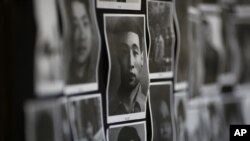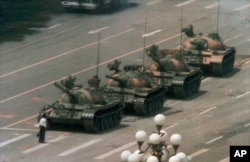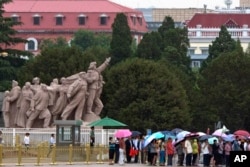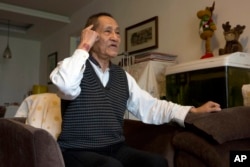A group of Chinese college students studying overseas is distributing an open letter calling for Communist Party leaders to be held accountable for the atrocities committed 26 years ago Thursday, when Chinese forces violently dispersed pro-democracy protesters in Tiananmen Square.
The letter, written by University of Georgia graduate student Gu Yi and co-signed by 10 other students, is the latest attempt to challenge China's intense propaganda campaign surrounding the incident, during which hundreds and possibly even thousands of peaceful protesters were killed.
It has also become an annual tradition for Beijing to round up and temporarily disappear sensitive figures ahead of the anniversary.
US calls for release of activists
U.S. State Department spokesman John Kirby called on China to release activists detained on Tiananmen-related charges and to stop harassing those who want to commemorate the anniversary.
"The United States urges the Chinese government to uphold its international commitments to protect human rights and fundamental freedoms," Kirby said in a statement.
Beijing does not allow any public discussion or commemoration of the Chinese People's Liberation Army's June 1989 massacre of the student protesters, who had gathered in central Beijing and elsewhere across the country to call for democratic reforms and an end to rampant official corruption.
As a result, many young Chinese are unaware of the even the basic details of what is seen as one of the most defining moments in the history of the Chinese Communist Party. The writers of the letter hope their efforts will help increase public awareness in China.
'Killers must be tried'
"The more we know, the more we feel we have a grave responsibility on our shoulders," the letter reads. "We are writing you this open letter, fellow college students inside China, to share the truth with you and to expose crimes that have been perpetrated up to this day in connection with the Tiananmen Massacre in 1989."
"We do not ask the CCP (Chinese Communist Party) to redress the events of that spring, as killers are not the ones we turn to … clear the names of the dead, but killers must be tried. We do not forget, nor forgive, until justice is done and the on-going persecution is halted," the letter continues.
The letter has been distributed inside China via PDF, a file format that has allowed it to more easily bypass China's stringent Internet censors. The document has also been more widely read after the Communist Party-run Global Times newspaper wrote an editorial slamming the letter.
'Overseas hostile forces'
The Global Times, whose editorials often reflect official opinions, slammed the students' "extreme views" on the Tiananmen incident. "[The student letter] harshly attacked the current Chinese regime, twisting the facts of 26 years ago with narratives of some overseas hostile forces," the article said.
"If the letter is truly written by a few students overseas, we have to say that those young people have been brainwashed in foreign countries, copying the paranoid minority overseas," it added.
Chinese censorship authorities later demanded that the Global Times article be removed from official online news portals, according to the China Digital Times website, presumably because it was having the opposite effect intended.
Chinese leaders, when they mention the Tiananmen incident at all, usually attempt to justify the PLA's violent crackdown by highlighting the massive economic progress achieved by Communist Party leaders in the subsequent decades.
Critical of party
A longtime adviser to former Prime Minister Zhao Ziyang this week challenged that argument
In an op-ed in The New York Times, Bao Tong said, "Many people long for the party leadership to voluntarily admit the injustice and illegality of the killings."
"This is also my hope," he said. "But I am not optimistic, because so far there have not been many signs to suggest that this will happen."
Bao also deplored what he called the "top-to-bottom corruption" of the Communist Party, which he said has allowed powerful officials and their family members to get rich at the expense of others.
Beijing has launched an intensive campaign to weed out official corruption. But this will not be effective, Bao said, partly because independent citizens are treated as criminals if they expose corruption.
"Popular movements to combat corruption are, as they were in 1989, sternly repressed," he said.
Bao was an aide to ex-prime minister Zhao, who took a more conciliatory approach toward the Tiananmen protesters and was subsequently ousted by late leader Deng Xiaoping.
In his New York Times op-ed, which was published Wednesday, Bao said he has for the past month been prevented from giving interviews. Hong Kong media later said he was one of several figures forced to leave the Chinese capital ahead of Thursday's anniversary of the massacre.
It has become an annual tradition for Beijing to round up and temporarily disappear sensitive figures ahead of the anniversary.







